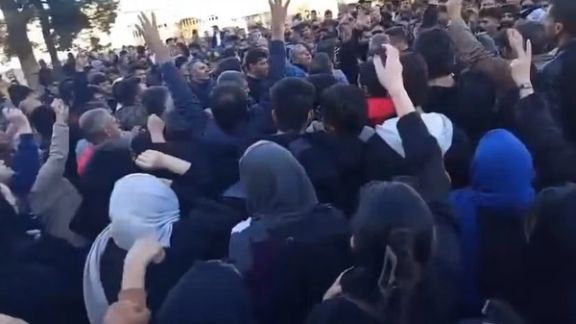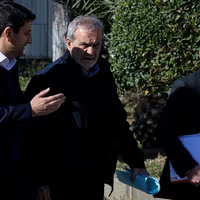Tenfold rise in intelligence ministry's budget raises eyebrows in Iran
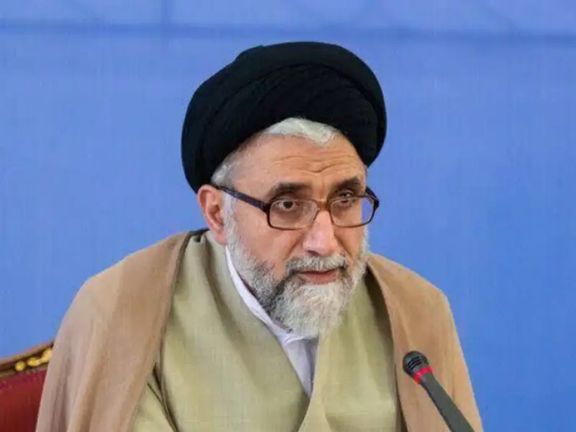
The Islamic Republic has increased its intelligence ministry's budget by tenfold under late President Ebrahim Raisi amid a severe economic crisis plaguing the nation.

The Islamic Republic has increased its intelligence ministry's budget by tenfold under late President Ebrahim Raisi amid a severe economic crisis plaguing the nation.
The Ministry of Intelligence is accused of being involved in the systematic forced disappearance of dissidents and obtaining forced confessions from political prisoners. However, the Islamic Republic's intelligence minister claims the ministry has used its increased budget for confronting the country's archrival Israel.
"With a tenfold infrastructural budget, pursued by Raisi and the parliament through the budget law, we were able to expand our security infrastructure and effectively counter Israel," said Esmail Khatib, the Minister of Intelligence, in a report on the government's three-year performance.
Khatib's admission of a tenfold budget increase for Ministry of Intelligence under the Raisi administration has raised alarm bells. While ordinary Iranians struggle with economic hardships, their government is channeling unprecedented resources into its intelligence apparatus, prioritizing cyber warfare and international espionage over the welfare of its citizens.
The Financial Times reported in 2022 on the Iranian government's deep-seated fear of Israeli operations within Iran, suggesting that Israel has established a widespread network capable of operating freely within the country.
In recent years, the Islamic Republic has accused Israel of eliminating its key nuclear officials and stealing confidential nuclear documents. One high-profile incident involved Mossad agents stealing a massive cache of nuclear documents from a warehouse near Tehran in January 2018, as mentioned by Israeli Prime Minister Benjamin Netanyahu.
The increase in funding also coincides with a notable uptick in cyber-attacks carried out by hacker groups affiliated with the Ministry of Intelligence. A recent report by cybersecurity firm Check Point highlighted that the hacker group MuddyWater has launched a series of global attacks using newly developed malware.
Since the Hamas attack on Israel on October 7, which claimed the lives of almost 1,200 people mostly civilians, such cyber-attacks have intensified, targeting countries like Israel, Turkey, Algeria, Italy, and Egypt. Such aggressive cyber activity seems to be a direct result of the substantial budget increase, allowing Iran to bolster its security infrastructure at the expense of its people.
In his Sunday report, Iran's Intelligence Minister also claimed that after the Syria conflict, members of armed groups like ISIS entered Iran but were all arrested by Iranian security forces. However, his assertion rings hollow considering the deadly attacks that have occurred during Raisi's presidency, including the January 3 explosions at Qassem Soleimani's burial site in Kerman, which resulted in nearly 100 deaths and over 300 injuries. ISIS claimed responsibility, yet suspicions about the Islamic Republic's involvement linger, further undermining the perceived strength of Iran's military and security forces.

Iran's Oil Minister Javad Owji has claimed a major gas import deal with Russia as the country suffers from serious power shortages, without saying how the gas can reach Iran.
The declaration comes despite Iran possessing the world's second-largest proven gas reserves, amounting to approximately 29.6 trillion cubic meters, or 16% of the global total. The country’s resources, however, have not shielded it from a dire and ongoing energy crisis.
A nation rich in gas, yet starving for fuel
Owji's announcement on July 17 was made during a cabinet meeting chaired by Acting President Mohammad Mokhber, where he praised the late president Ebrahim Raisi’s efforts in securing the agreement. Raisi died in a helicopter crash on May 19.
The deal stipulates that Iran will receive 300 million cubic meters of Russian gas daily, with Russia also covering the construction costs of the necessary pipeline infrastructure, leveraging their technology for seabed pipelines. This is a gigantic amount of gas, which amounts to more than one-third of Iran's daily production.
Construction of pipelines able to handle such a volume of natural gas from Russian fields thousands of kilometers away would cost tens of billions of dollars, while Iran cannot afford to pay for such a huge amount of gas, with its hard currency revenues slashed by US oil sanctions. Currently there is no pipeline capacity to handle such a large volume of gas.
Despite the fanfare, the reality is stark. Iran's 23 gas refineries produce around 850 million cubic meters of sweet gas daily. However, the country grapples with gas shortages every winter and summer, forcing many industrial units, including gas power plants, to switch to Mazut—a low-quality, heavy oil notorious for its high pollution levels.

Iranian experts have long warned against the environmental and health hazards of using Mazut in place of natural gas to produce electricity. Yet, the severity of gas shortages during colder months has led to a disregard for such concerns, highlighting the government's failure to manage its vast natural resources effectively.
According to the International Energy Agency, gas accounted for about 71% of Iran’s energy supply in 2021, a 295% increase since 2000. Should this trend continue, experts warn that Iran may face chronic shortages in the coming years, further increasing its reliance on imports despite its abundant reserves.
The facade of energy diplomacy
Owji's portrayal of the Russian gas deal as an “economic and industrial revolution” is interpreted by many as misleading. The minister claimed that the agreement would not only stabilize Iran’s internal gas supply but also boost its gas export capacity and stability, involving financial exchanges worth $10 to $12 billion annually. He touted it as an “unprecedented achievement” in Iran's history, dubbing it a "masterpiece of the Raisi government's energy diplomacy."
Behind the facade: Struggles in joint fields and declining investment
In reality, Iran faces significant challenges in its 28 joint oil and gas fields with neighboring countries. It consistently lags behind its neighbors—such as Iraq, Qatar, and Saudi Arabia—in production due to a lack of investment. While these countries have ramped up their extraction efforts with the help of international, particularly Western, companies, Iran has seen its investment in upstream projects plummet. The Ministry of Oil relies on a meager 14.5% share of oil revenues for investments, amounting to just over $5 billion last year.

Statistics from the Parliament’s Research Center show a drastic decline in annual investment in Iran’s upstream oil and gas projects, from around $18 billion in the 1990s to about $7 billion in the early 2010s, and further dropping to $3 billion since 2017. International sanctions have crippled Iran’s ability to attract foreign investment or borrow funds, further exacerbating the situation.
A call for policy overhaul
The state of Iran’s energy sector underscores the urgent need for a major shift in the government's foreign policy. Without reaching an agreement with the West over its nuclear program, which is viewed as leading to weapons capability, and changing its hegemonial stance in the region, Iran's energy sector and broader economy will continue to flounder.
Owji’s celebration of the Russian gas deal as a "masterpiece" now is seen by observers as a thin veneer over the reality of Iran’s mismanagement and economic woes.
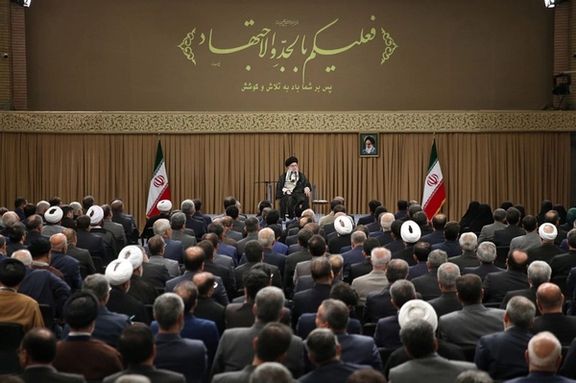
Iran’s Supreme Leader has defended a bill passed by the Iranian parliament in 2020 which played a significant role in preventing the revival of the JCPOA nuclear agreement.
"Some people protested and found fault with the Strategic Action law, which is absolutely unfounded. This law was very much the right thing to do," Ali Khamenei asserted on Sunday. He was referring to Iran’s "Strategic Action Plan to Lift Sanctions and Protect the Iranian Nation’s Interests," a law mandating the government to enhance its nuclear activities if the US does not lift sanctions.
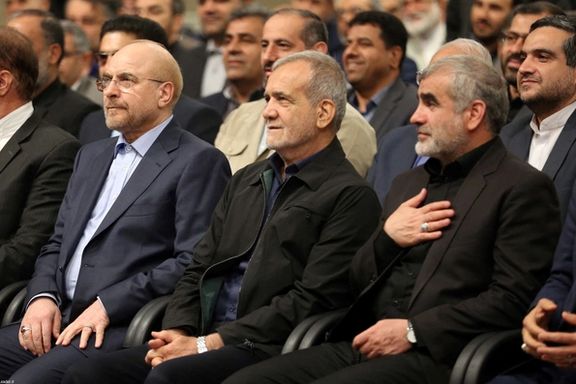
Khamenei’s Sunday statements signal Tehran’s continued reluctance towards negotiating with Western powers as Iran continues to find ways to evade global sanctions.
Previously, former Foreign Minister Mohammad Javad Zarif, speaking at an election round table on June 18, noted that both Israel and the Parliament's strategic law were significant factors preventing US President Joe Biden from returning to the JCPOA.
The 2020 legislation was initiated in November after the election of Joe Biden, who had already pledged to return to the JCPOA during his election campaign. Iran devised the legislation apparently as a pressure lever against the United States, because it mandated a higher level of uranium enrichment and less inspections by the UN nuclear watchdog, IAEA, as negotiations were about to begin in 2021.
The JCPOA, originally established in 2015, aimed to limit Iran's nuclear program in exchange for relief from economic sanctions. However, after the United States withdrew from the agreement in 2018 under former President Donald Trump, Iran gradually reduced its compliance with the deal, but never violated it in a major way until Biden's election.
Efforts to revive the JCPOA have faced significant obstacles despite the Biden administration's willingness to return to the deal as he pledged during his 2020 presidential campaign.
More recently the International Atomic Energy Agency (IAEA) has criticized Iran’s nuclear activities, raising concerns about the program's peacefulness. The IAEA reported that Iran has stockpiled large amounts of highly enriched uranium, with Raphael Grossi saying that Iran is "weeks not months" from a nuclear weapon.
Khamenei further elaborated on the role of Iranian parliamentarians in bypassing sanctions imposed on Iran by Western countries.
"Parliament can play a role in both lifting and neutralizing sanctions… neutralizing sanctions is more important than lifting sanctions… lifting the sanctions is not in your hands, but it is in your hands to neutralize such measures, and there are good ways to neutralize the sanctions,” Khamenei stated.
The Sunday session was also attended by President-elect Masoud Pezeshkian. Although Pezeshkian has pledged to work towards lifting US sanctions during his recent presidential election campaign, he has emphasized he would follow Khamenei’s policies.
Despite sanctions for not only the nuclear program but for supporting Russia's war on Ukraine and rights abuses at home, Iran's oil exports have significantly increased. They have risen from 400,000 barrels per day after the 2019 US sanctions to over 1.5 million barrels per day currently.
Iran has employed numerous mechanisms through a wide range of entities and organizations to sell its oil via third parties to evade sanctions.
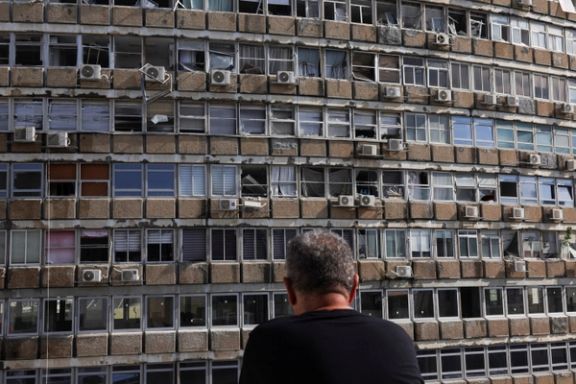
As Iran’s Houthi militia launched a surface-to-surface missile towards the Red Sea town of Eilat Sunday, intercepted by Israel’s Arrow 3 missile defence system, experts ask why Friday’s attack on Tel Aviv went undetected for 2,600 kilometers.
The Sunday attack follows Israel’s first direct hit on Yemen at the weekend targeting Hodeida Port, killing six and wounding around 87 others in retaliation for a drone attack from Yemen on a residential building in Tel Aviv that killed one man and wounded multiple other people.
The attack on Israel’s central city in the early hours of Friday morning has sparked an investigation as to how the Yemeni militia infiltrated Israel’s air defence systems with no alarms sounded to warn residents to go to shelters.
Onn Fennig, CEO of R2, an Israeli anti-drone manufacturer which is training international militaries such as the British armed forces in anti-drone warfare, said: “Nobody in this field thinks it was identified on the day. These systems are extremely hard to detect, for many reasons."
The drone which made the hit in Israel’s second city was able to fly more than 2,600 kilometers, according to the Israeli Air Force, without being detected, meaning air defence systems from allies on its indirect route across the region, including the UK, US and Egypt, also did not detect the breach.
Fanning said: “The IDF said it was identified and misclassified but what does that mean that all our allies misclassified it?”
This specific occasion raises many questions about the Israeli Air Force’s ability to detect such threats. “I think the IDF has a lot of answers to give as does the Ministry of Defence to Israeli citizens,” he said.
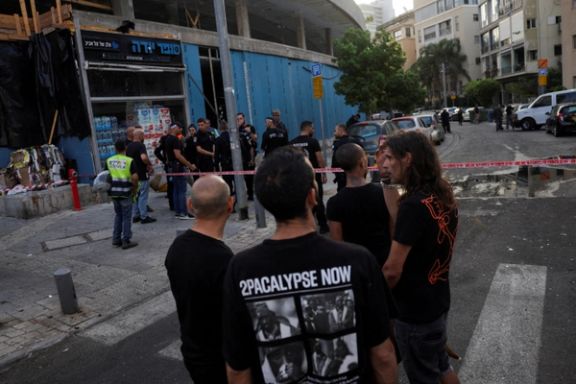
This kind of drone is “extremely hard to find," he admitted, speaking to Iran International. “They’re flying very low, below radar mostly, they’re using the terrain to hide from radars and other detection sensors, and in many cases they have low radar signatures, so it’s hard for radars to catch them,” he explained.
Often made out of plastic or carbon composites, they have a low radar signature, legacy radars designed to detect metallic objects. “Once you make these drones out of plastic or composite materials, radars aren’t suitable and so you need other techs to detect it,” he added, the solution a blend of multiple systems working together such as radars, cameras and acoustic centers like Ukraine is using now against Iranian drones in Russia.
Another factor which makes these drones able to evade detection is the smaller numbers. “If there were more, the radars might detect them but one or two, the legacy systems won’t be able to detect it,” he said.
It comes in contrast to the April barrage of Israel when around 350 drones, rockets and missiles were sent by Iran, intercepted by Israel and a US-led coalition.
Drones are flying over Israel three to five times a day as the Jewish state fights Iran’s proxies across its borders, including the north where they are fighting Lebanon’s Hezbollah terror group.
An investigation by the Israeli Air Force announced Sunday that the IAF was at the time of the infiltration already in combat with an Iran-backed drone from Iraq.
The number of spotters has now been doubled as the implications of the threat reverberate as far as Washington.
The IAF said the Iranian made drone took a circuitous route across countries including Eritrea and Sudan, taking 16 hours to reach its target.
It tracked the drone for six minutes while it approached Tel Aviv from the sea, the IAF said Sunday.
“Anyone can make a drone at home for less than $1,000”, Fennig said. “Warfare is changing and the balance between the strong and the weak is changing on its head. It’s not economically viable to shoot down $1,000 quad copter with a $700,000 missile. Those from Yemen and Iran can be more, as much as $30,000, but the imbalance is still there.”
Intelligence analyst, Ronen Solomon, a research consultant for over a decade for Israel’s Ministry of Defence, told Iran International that if there was an error spotting the UAV, it could have been that they had taken parts from a Western, or non-enemy plane, and put it on the UAV.
“For a controller looking at a flight coming from the sea or Egypt to Tel Aviv with western identification, they would hesitate to interrupt it,” he said. “Maybe this is the case when the air force said it was human error and it didn’t think it was a suicide UAV.”
He said that in those early hours of Friday morning when the drone struck an apartment building in central Tel Aviv, there are many long distance flights on the same route as the suicide drone which is believed to have been headed for the US embassy on Israel’s coastline.
“I am now assuming it was traveling through civilian air traffic and maybe flying next to other planes which were also landing at Ben Gurion so if they saw it near an airplane, maybe they would be afraid of doing what happened in Tehran,” Solomon said, referring to the Ukrainian airliner downed by the IRGC killing all 176 people on board.
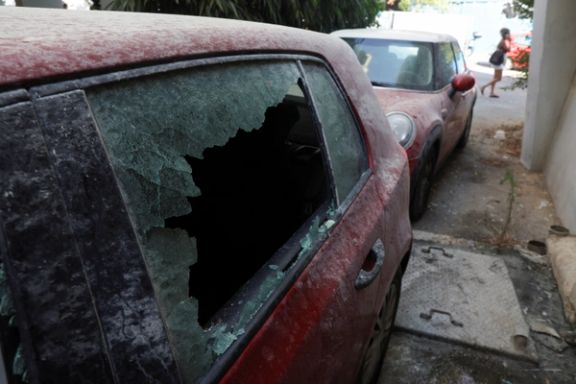
However, another possibility is that Israel simply did not see the UAV. “If it was flying near a civilian plane, maybe they didn’t see it, and maybe they saw it too late,” he said as the investigation continues.
The Houthis began a Red Sea maritime blockade in November, affecting one of the world’s major trade routes. Multiple seamen have been killed and dozens taken hostage in the siege which began targeting Israeli linked vessels but has expanded to international shipping.
Since Iran’s Supreme Leader gave orders for the blockade in November, “hundreds of ballistic missiles, cruise missiles and drones” have been launched against Israel from the Iran-backed Yemeni militia, with one landing in an area outside Israel’s southern port town of Eilat, according to Israel’s Prime Minister, Benjamin Netanyahu.
The Yemeni port struck on Saturday has been used to smuggle weapons from Iran, Netanyahu said, with the airstrike targeting fuel depots and energy-related sites in a bid to cripple the militia’s economic resources.
However, after a weekend of tit-for-tat strikes, the crisis, sparked by Israel’s war against Iran-backed Hamas in Gaza, is spiralling.
The IRGC’s Sepah Media said Iran’s IRGC has given official approval for retaliatory strikes since the weekend attack with a banner now in Tehran’s Palestine Square warning that Friday’s explosion was only a “test” with a “swarm” of drones headed for Israel’s central city, warning residents to “run now”.
In defiant terms, Israel’s defence minister, Yoav Gallant, said Israel’s response will continue to be firm. “The blood of Israeli citizens has a price. This has been made clear in Lebanon, in Gaza, in Yemen, and in other places - if they will dare to attack us, the result will be identical.”
The fear now is that if a Houthi drone can enter Israeli air space, that it can either crash drones into planes or even the airport, says Solomon.
“The Houthis have attacked ships using air and sea tracking real time applications and what’s worrying now is that if they can fly near a plane, they can attack a plane en route to the airport,” he said.
Netanyahu has been vocal about Iran’s responsibility for the ongoing attacks from Yemen and the Islamic Republic’s proxies in the region.
“The drone attack that struck Israel in the early morning hours yesterday shows that more than defensive action is needed to curtail the Houthis. Offensive action is also needed. It’s needed to ensure that Iran's terror proxies pay a price for their brazen aggression,” he said.
Speaking of the maritime blockade, which has seen a more than 20-nation coalition formed and led by the US, to repel the Houthi attacks, Netanyahu added: “The international community must redouble its efforts to protect this vital waterway and to hold both the Houthis and their Iranian sponsors accountable for their aggression.”
He said Israel is being attacked by Iran and its proxies on seven fronts, the Houthis in Yemen, Hamas in Gaza, Hezbollah in Lebanon, Shiite militias in Iraq and in Syria, Iran backed terror attacks in the West Bank and the direct attack from Iran on April 14.
The inaugural assault saw hundreds of projectiles sent towards Israel, retaliation for an alleged Israeli strike on the Iranian consulate in Damascus. Most of the assault was intercepted by Israel and a US-led coalition.
“In defending ourselves against this Iranian terror axis, Israel stands on the front lines against a regime that threatens the entire Middle East, that threatens the entire world,” added Netanyahu.
“All those who seek to harm us will pay a very heavy price for their aggression,” he warned as the war of words escalates deeper.

Despite Iran's strict Islamic laws governing sexual behavior, an expansive underground industry of massage services is seemingly becoming a front for prostitution, while a simple hijab violation can lead to violent arrest.
The operations, flourishing on social media, reveal the deep socio-economic and moral contradictions of the Islamic Republic. In a country where public morality is dictated by Islamic principles, the seeming rise of massage services on social media platforms like Instagram already presents a striking paradox.
And, while many of these pages appear to advertise therapeutic services, a closer examination by Iran International uncovers a different reality: a covert network of prostitution operating under the guise of massage therapy.
One such page is run by a woman claiming to hold a degree in physiology from Tehran University and an international certificate from Malaysia in massage therapy. Her profile reads, “I am a massage therapist and provide massage services for men and women in Tehran.”
Iran International cannot independently verify the authenticity of the pages or their content. Additionally, some videos appear to feature masseuses from other countries.
The services advertised include home visits, foot massages, hot stone massages, and Thai massage, accompanied by photos of a salon purportedly located in northern Tehran. Videos of young women massaging men are also posted, allowing clients to select their preferred masseuse.
One of the pages' links to a Telegram channel reveals a different side of the services.
There, the services listed go far beyond traditional massage therapy, encompassing threesomes, lesbian encounters, group sex, and sex with "shemales". The prices ranged from: 21 million rials (approximately $36) for a 90-minute massage, 47 million rials ($81) for a massage plus sex, 62 million rials ($107) for an overnight session, and 130 million rials ($224) for a 24-hour session.
Prostitution is illegal in Iran, with severe penalties for those caught participating in or facilitating it.
Adultery, sex between unmarried people, and homosexuality can result in imprisonment, flogging, and, in some cases, the death penalty.
Despite the Islamic Republic's punitive laws, the underground sex trade persists, according to observers and experts, fueled by factors such as poverty, unemployment, drug addiction, and lack of education. Economic hardship in the country has also been cited as a contributing factor, rendering Iranian women vulnerable to exploitation and coercion into prostitution.
When Iran International contacted the page administrator of the aforementioned Telegram page for more information, an individual promptly responded with a pre-prepared list detailing the rules and payment methods.
That individual stated that half of the fee is paid in advance, with the remaining half paid after the service. The advance payment was to be made to a bank account under a different name, raising questions about the legitimacy of the operation.
Whether fraudulent or genuine, the pages paint a disturbing picture of life under the Islamic Republic: Individuals are either exploiting Iran's illegal prostitution trade to deceive and extort money from young people with impunity -- or, young women in their 20s and 30s are engaging in prostitution for less than $50.
Further investigation by Iran International revealed numerous similar pages operated by Iranian administrators.
Some pages only vaguely hint at sexual services through suggestive photos, while others openly advertise prostitution. Prices on these pages varied from $35 to $250, depending on the duration and specifics of the service.

Due to the sensitive nature of the content and for the safety of the individuals reportedly depicted, Iran International has refrained from using the names listed on the pages.
A, aged 24, appears in an advertisement offering sexual services, accompanied by a health certificate and proof of COVID vaccination to seemingly reassure clients of no risk of sexually transmitted diseases. Charging approximately $225 per day, she offers to accompany clients on trips, with photos ranging from casual attire to partially nude poses.
Another woman, M, has posted blurred videos depicting oral sex. Her photos showcase herself posing on beaches, in studios, and at gyms, displaying her physique in an apparent bid to attract potential clients.
R, aged 27, is presented as available for international travel upon request from clients.
Another woman, E, aged 25, is featured in a promotional video blowing a kiss and winking from a swimming pool setting.

When it comes to enforcing Iran's prostitution laws, the Iranian government exhibits selectivity and inconsistency. Authorities frequently turn a blind eye or focus on high-profile crackdowns, with their actions widely believed to be steered by corruption and bribery.
While the public perception of prostitution remains predominantly negative, reflecting conservative religious values, there is an acknowledgment of the socio-economic factors contributing to its existence.
Efforts to combat prostitution in Iran are further hindered by both legal and cultural constraints. Although there are some initiatives aimed at supporting and rehabilitating sex workers, NGOs and activists encounter significant challenges, including government restrictions and societal stigma.
Experts have often lamented that effectively addressing prostitution in Iran necessitates identifying and targeting its root causes, which include poverty and limited opportunities, in addition to initiatives focused on raising awareness and providing education, vocational training, and healthcare services.
While the government rigorously enforces moral codes such as mandatory hijab, prostitution persists, exploiting vulnerable women right under its nose.

Persian language social media is abuzz with the revelation that the Iranian host of a popular crime podcast has allegedly murdered his wife and then committed suicide in Canada.
The parallels between the crime he narrated in the last episode of his podcast “The Last Witness” and the actual events have left fans and followers in disbelief.
Canadian State Police reported the discovery of a mutilated body of an Iranian woman in a suitcase in the city of St. John, Newfoundland on Friday. The woman's identity was not disclosed, but the primary suspect, believed to be her husband, was later identified by social media users. For legal reasons, Iran International refrains from publishing names of the people involved in the case. According to social media posts, the murder suspect was known for his podcasts and is a PhD student in informatics in Canada.
Canadian news websites reported that before the woman's body was discovered, her husband's lifeless body was found at his home in downtown St. John on July 15. Preliminary assessments suggest that the 34-year-old man committed suicide. A day later, on the evening of July 16, a citizen found a suitcase containing the remains of a woman and contacted the police.
James Cadigan of the Newfoundland Police Department described the death of the woman as a homicide.
"The deceased is a 33-year-old woman who was found in the area of Water Street near Springdale Street in the suitcase," Cadigan told Global News.
Reports indicate that the murder suspect had been living in Newfoundland for several years for educational purposes, while the victim had arrived in the province in mid-May this year.
Cadigan mentioned that there were no prior records or cases involving this couple with the regional police. The state police are also creating a timeline of events and reviewing area surveillance footage from July 10 to 16. They have requested anyone with information to contact them.
The police released an image of a man pulling a suitcase, hoping to obtain public information about the suspect's activities before his suicide.
"It was important that we provided a visual of the suitcase and the individual because we believe that he traveled throughout the downtown area of Saint John’s," Cadigan said.
The officer believes the suspect was traveling on foot for a period of time as he walked through some residential areas towards Water Street.
In 2021, Canada had 213,160 residents who were born in Iran, with 70,395 of them having immigrated since 2011.
